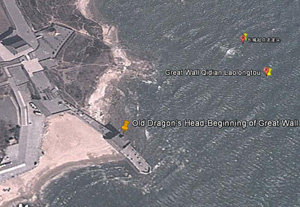TOUR 12A:
Twelve-day Great Wall Trekking & Camping:
from Old Dragon's Head of Easternmost Seashore to
the Forbidden City in Beijing
Free airport transfers!
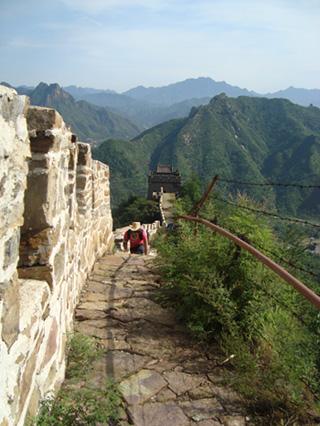
The
Great Wall is
the longest
man-made structure in the world, stretching 8,851 km (5,500 miles)
long. It is
said to be one of the Seven Wonders of the World.
This is the longest and most comprehensive Great Wall tour that we
offer, and you'll be hard pressed to find a better constructed one at
any other travel agency. We've got you covered from the moment you
arrive in Beijing, as pick-up and drop-off from the airport is included.
Then, we'll set out on a nearly two-week odyssey that will take you from
the Great Wall's eastern most point, making our way slowly east back
towards Beijing.
In addition to the sections of the Great Wall you'll explore, you'll
also be able to take in numerous villages in the Chinese countryside,
giving you an authentic look into Chinese society. Besides the Great
Wall you'll be taken to the East Qing Tombs, the final resting place for
many emperors of China's last ruling dynasty, the Qing. You'll get to
trek on the two most popular Great Wall hikes (Jinshanling-Simatai and
Jiankou-Mutianyu), and when you get back to Beijing you'll get to pick
any kind of city tour you like (Forbidden City, Summer Palace, Temple of
Heaven, etc.)
Please be advised that this program should be taken by those in good
physical condition, as there will be a great deal of physical activity
required.
12-day
Highlights:
 Explore the best of the eastern Great Wall, from the
beginning of the Wall by the ocean all the way to Beijing Explore the best of the eastern Great Wall, from the
beginning of the Wall by the ocean all the way to Beijing
 Gain a greater understanding of the Great Wall’s strategic and
military importance, as well as it’s architecture Gain a greater understanding of the Great Wall’s strategic and
military importance, as well as it’s architecture
 Visit sections not well known to western tourists Visit sections not well known to western tourists
 Free Airport pick-up and drop off service Free Airport pick-up and drop off service
 Decent
accommodation at Holiday Inn Express downtown for three nights. Decent
accommodation at Holiday Inn Express downtown for three nights.
Departure:
Our Great Wall hiking is a
private service. What this means is that you can hike on the Great Wall
at any time at your convenience. If you would much
rather be part of a group for the experience
for economic and social reasons,
we'll check to see if there are more signups for the same date as your
own. We'll keep you updated whenever there are more. If you would like
to keep your tour a private one, please let us know and we'll assign you
a guide and driver.
 Click for the Trip Map
Click for the Trip Map
Day-by-day
Great Wall Trekking Itinerary
DAY 1 |
DAY
2 |
DAY 3 |
DAY 4 |
DAY 5 |
DAY 6 |
DAY 7 |
DAY 8 |
DAY 9
| DAY
10 |
DAY 11 | DAY 12
Day 1: Arrive in Beijing
Our Great Wall Adventure representative will meet you at Beijing
International Airport. You will be staying in Holiday Inn
Express Downtown Beijing or similar. Our
guide will give you a briefing on the tour ahead, and the rest
of the night is up to your discretion.
[TOP]
|
Day 2: Beijing-Old Dragon’s Head-Shanhaiguan
(B+L+D, 4 hours)
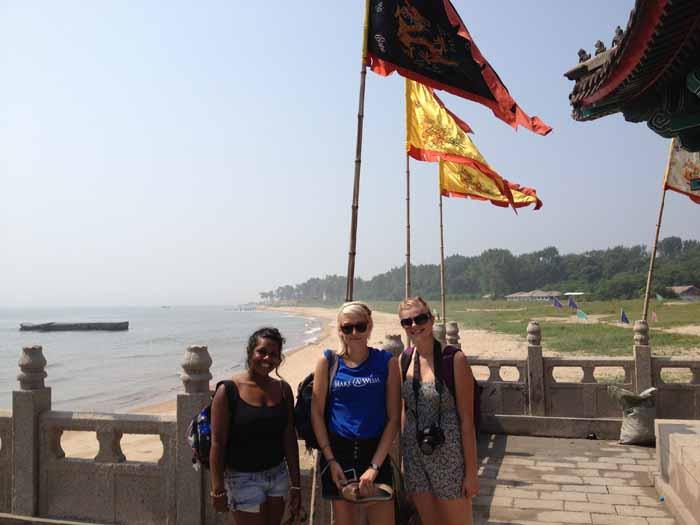
We will meet you at your hotel in the morning between 7:30-8am,
and from there we will make the 4 hour drive to the
Shanhaiguan
Pass, which is in a town situated in the northeast of
Qinhuangdao City, Hebei Province. It adjoins the Bohai Sea to
the southeast and the Yanshan Mountain to the northwest. We will
start our hike at Old Dragon’s Head, also known as
Laolongtou.
Laolongtou is the most eastern beginning of the Great Wall,
which extends into the Bohai Sea. Standing here is almost like
being on a peninsula as you can feel the overwhelming power of
the rolling sea.
After marveling at the scenery here, we'll have a lunch in a local Chinese
restaurant. After that, we’ll have a tour to the
Great Wall Museum
to learn about the history of the Great Wall. You’ll also learn
about the history and military strategy of this section of wall,
as well as see military relics.
We will make our way to the Shanhaiguan Pass Fortress, which is also known as “The First
Pass under Heaven.” We will enter the Shanhaiguan Great Wall Museum, where we will learn about the
history and military strategy of this section of wall, as well
as displaying military relics.
For the night we will stay at the Jinshan Hotel next to the
Shanhaiguan Pass and have a
tasty dinner of Northern Chinese cuisine to get you started for
tomorrow’s hike. After dinner, you can have a free tour to the
old town of Shanhaiguan. You can buy souvenirs or even watch a
street concert of the local residents.
[TOP]
|
Day 3: Jiaoshan Great Wall
(B+L+D, 12 kms/6
miles, 5 hours)
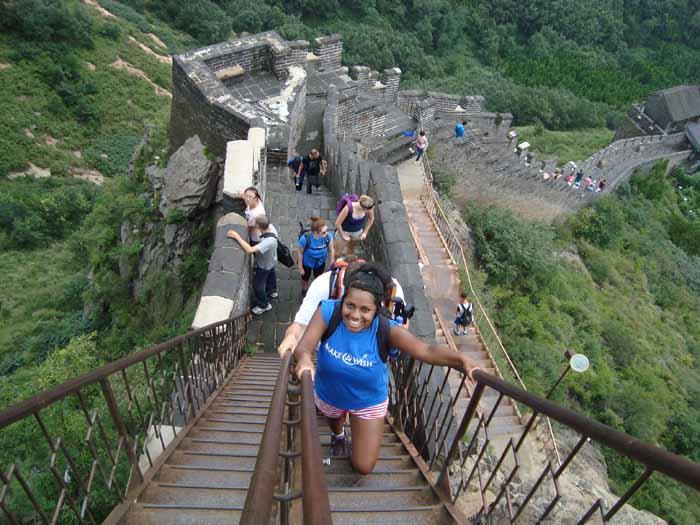
After getting up at 7:30 and eating breakfast, we will make a
short drive to the foot of a mountain and hike
Jiaoshan Section of the Great Wall.
Three
kilometers north of Shanhaiguan, the easternmost pass through the main
section of the Great Wall, stands the 500- meter Jiaoshan Peak. Though
relatively diminutive in size, this is the first actual mountain the Great
Wall passes heading west, and so is known as “the first mountain of the
Great Wall.” Unlike the newly restored wall, Jiaoshan ancient wall
provides you a sense of historical vicissitude. Walking on the
dilapidated wall is a great challenge. The wall appears more and
more crumbled and deformed as you forge ahead.
We'll overnight in a local hostel in Dongjiakou area, our next
stop for continuous hiking.
[TOP]
|
Day 4: Dongjiakou Great Wall Village (B+L+D, 10
kms/6 miles, 4-5
hours)
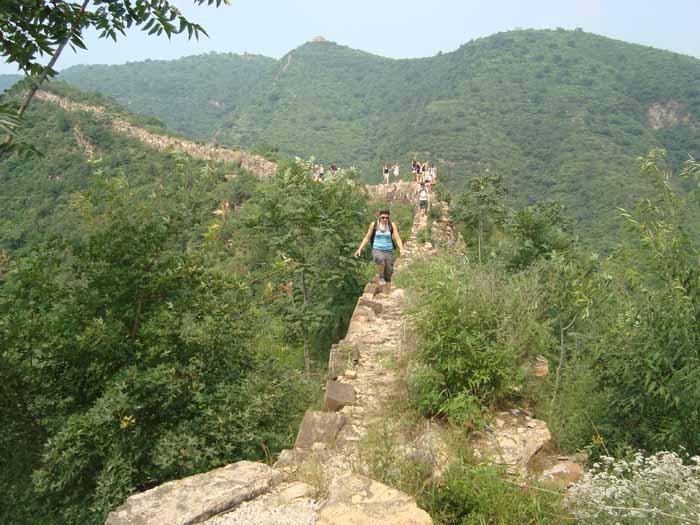
Our day will begin with breakfast with our local host family and
then we'll start hiking in Dongjiakou.
Dongjiakou is a pass of the Great Wall constructed in Ming
Dynasty (1368-1644) as well as an important fortress that guards
the Shanhai Pass, which is hailed as "the first pass of the
Great Wall" due to its strategic location in the ancient time.
Dongjiakou Great Wall is 8.9 km, with the complete wall
stretching for over 3 km, a broken section of over 1.8 km and
the other sections being natural steep mountains without wall.
Apart from the castles, about 60% of constructions of Dongjiakou
Great Wall including defense towers and beacon towers are still
in intactness on the whole.
In the afternoon, we'll drive to a hotel located near the
Huangyaguan Section of the Great Wall. You will have a
relaxiation tour to the small historic town nearby for the
evening.
[TOP]
|
Day 5: East Qing Tombs-Huangyaguan (B+L+D,
3 hours)
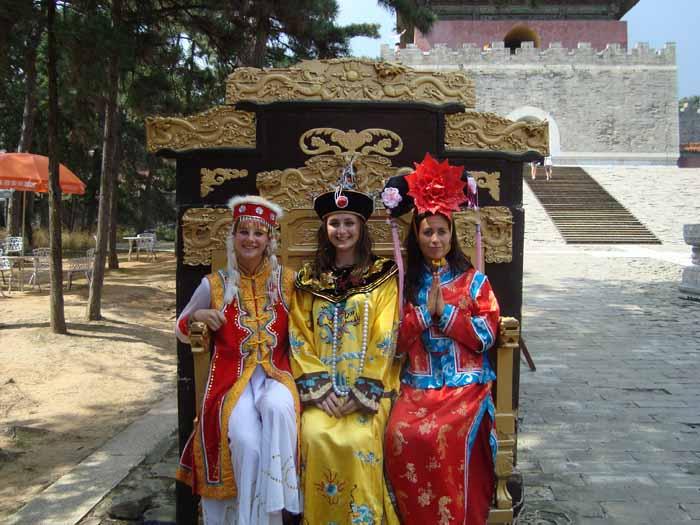
After waking up at 7:30, we will make the short trip to the East
Qing Tombs. The Eastern Qing Tombs, which is among the finest,
best-preserved and largest of the extant tomb complexes in
China. Along the south side of Changrui Mountain, the tombs of
five emperors, four empresses, five imperial concubines, and one
princess are arrayed based on the traditional concept of placing
the most senior and most distinguished in the center.
Of all the tombs, Xiaoling is the biggest and most elaborate,
standing as the focal point of the entire structure. The
grandeur of this tomb may be attributed to its having been the
first sepulcher constructed for a member of the royal family of
the Qing Dynasty, so the builders hoped to set the tone for a
prosperous future. Crossing through the Great Red Gate, you can
see buildings of different sizes, all with roofs of yellow
glazed tile, connected by the brick paths or 'sacred ways' that
converge in the area of Xiaoling.
An example of the most exquisite architecture of the Eastern
Qing Tombs is Qingdongling, the tomb of Empress Dowager Cixi.
Although she handled affairs of state for more than 45 years,
she never ascended the throne. (The only female ruler in Chinese
history was Empress Wu Zetian in the Tang Dynasty (618-907).
Elaborate and highly refined decorations and carvings inside
Qingdongling make it unique among the tombs of the Qing Dynasty.
The main material used in the tomb, which took six years to
build, was gold, the symbol of royal family.
Huangyaguan.
It is designed as a miniature of the entire Great Wall of China,
thereby allowing you get an understanding of the entire wall in
a fraction of the time. The entire section is built on an abrupt
mountain ridge. Being endowed with both natural beauty and
cultural interest, it has become famous as a natural beauty spot
and a summer resort.
After about an hour’s walk we will reach a peak overlooking the
valley below. From the peak we can also see the Huangyaguan
Fortress, which was restored in 1984. From this vantage point,
we will be able to see its Baguan pattern, a specially designed
labyrinth designed to confuse and entrap the enemy. We will then
walk down to the fortress for a fascinating and informative
visit inside.
We'll over night at the foot of Huangyaguan Great Wall
in a hotel called Huangyaguan Villa. See
below picture to see how fantastic the view is to see the Wall from
the hotel.
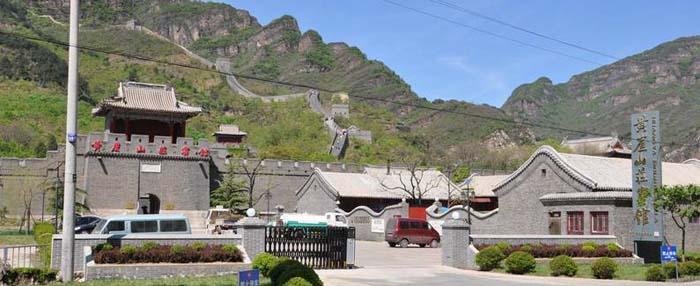
[TOP]
|
Day 6:
Peace Fort-Huangyaguan-Sky
Ladder-West Simatai
(B+L+D, 8 kms/5 miles, 4-5 hours)
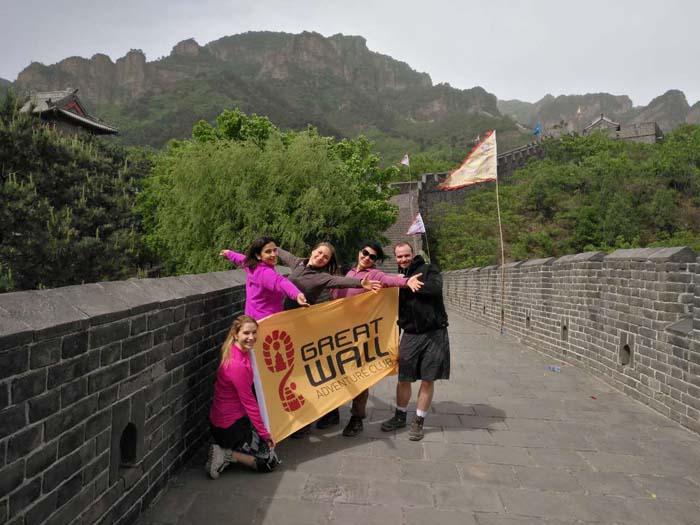
Following breakfast at the inn we will begin our hike of the Huangyaguan
Great Wall. We will walk from Taipingzhai to
Huangyaguan with the chance to see the Widow Tower.
It is designed as a miniature of
the entire Great Wall of China, thereby allowing you get an
understanding of the entire wall in a fraction of the time. The
entire section is built on an abrupt mountain ridge. Huangyaguan is
situated in a beautiful valley in the heart of the Yanshan
Mountains. We start our walk heading up the steep renovated steps
towards what appears to be a sheer cliff face. This is where we
encounter "Heavens Ladder", a steep climb of over 200 steps leading
us up to the cliff face. Once we have caught our breaths, the path
continues gradually up to the top of the ridge and once again the
old Wall, which follows the contours of the mountain. From the peak
we can also see the Huangyaguan Fortress, which was restored in
1984. From this vantage point, we will be able to see its Baguan
pattern, a specially designed labyrinth designed to confuse and
entrap the enemy.
Six miles southeast of Huangyaguan Pass is the Taipingzhai
Great Wall, another important mountain stronghold of the
wall during the Ming Dynasty. It is also called
Taipinganzhai, meaning "a village of peace and prosperity".
Starting from Banlagang Mountain in the east and arriving at
Guafu Tower (Widow Tower) in the west, it winds through the
precipitous mountains for about 955 yards. There are six
watch towers, one battlement, and one shortcut leading to
the wall. The architectural styles of the military towers
vary considerably. There are square, round, solid and hollow
towers, with some inside and others outside the wall. Beside
the shortcut, there is a small citadel where an 8.5-meter
statue of Qi Jiguang, the chief commanding officer of Ji
Garrison (one of the eleven garrisons in the Ming Dynasty)
is located. To the west of the citadel, a section of the
wall extends 33 yards out to where a sentry post was
situated. At the western end of the wall is a square stone
tower called Guafu Tower, "Widow Tower" in English, built by
twelve wives whose husbands died during the construction of
the wall in the Ming Dynasty. Besides these cultural points
of interest, Taipingzhai Great Wall is also famous for its
amazingly impressive scenery. Zigzagging along the mountain
ridge for over 984 yards, the wall looks very much like a
giant dragon flying through clouds.
We will keep climbing toward the west on the Great Wall through the Sky
Ladder. The incline is steep and a great challenge! Walking
westward for 503 meters (550 yards) from the Huangya Pass, you
will get to the steepest segment of this section, the Huangya
Sky Ladder. Stairs there are not very smooth. Some of them even
crack in the middle. Stretching to the top of the ridge, this
long stairway seemingly leads to the sky. Climbing over the
ladder, you will reach the primitive Great Wall built in the
Northern Qi Dynasty, marking the end of the Huangyaguan section.
In the afternoon, we’ll drive to the
West Simatai Great Wall, where we will overnight in one of our
partnership hostels at the foot of the Great
Wall.
[TOP]
|
Day 7: Simatai-Jinshanling
with Camping on the Great Wall (B+L+D,
10 kms/6
miles, 4-5 hours)
Our hike will start from Simatai, and we will make our way west
along the wall into Jinshanling. This is the classic Great Wall
hike that mostly wall enthusiasts have done. Unlike most hikers,
we will take this popular route in the opposite direction. At
first we will encounter deteriorated “Wild Wall” and the hiking
will be a little steep. But as we make our way west the wall
will gradually turn into a more restored state, and the hiking
will get progressively easier. The hike today allows you to
compare the differences between the two wall types, and this is
both highly enjoyable and informative.
After reaching Jinshanling we will have a brief lunch. Tonight,
we'll have the opportunity to camp on the Great Wall.
Only the Great Wall Adventure Club can
guarantee you the unique experience of sleeping in a watchtower
on the Great Wall. All camping tents, sleeping bags and base
pads are supplied.
[TOP]
|
Day 8: Jinshanling-Gubeikou (B+L+D, 10
kms/6
miles, 4-5 hours)
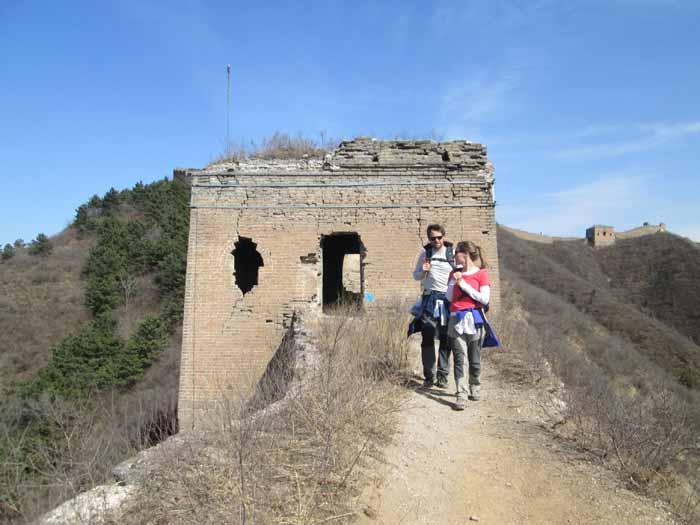
We will be continuing our hike westward from Jinshanling until
we reach the General Tower at Gubeikou. Gubeikou
is mostly “Wild Wall” so the hiking will be tougher than the
beginning of our hike.
Gubeikou was first built during the Northern Qi Dynasty
(550-557) and rebuilt in Ming Dynasty (1368-1644).
Stretching for about 25 miles (40 kilometers), there are 172
watchtowers, 14 beacon towers, 16 passes, 3 water passes, 3
barbicans, and 6 fortresses along it.
In 1933, Chinese army fought against
Japanese invasion troops in Gubeikou. In
the four-month-long battles, over 5,000 Japanese soldiers were
killed while 9,000 Chinese soldiers died. It was amazing that
ancient wall was still useful in the World War II. You can see
that Gubeikou is not merely a relic but it remained as a
battlefield in modern world.
The Jinshanling section of the Great Wall is 10.5 km long[1]
with 5 passes, 67 towers and 3 beacon towers. The views of
Jinshanling are often used as the "Great Wall official pictures"
by the Chinese government in its public publications and
building decoration.
We will have a late lunch in a local restaurant after we
complete today's hike. Tonight, we'll check into one of our
approved local farmotel to sleep.
[TOP]
|
Day 9: Jiankou
Adventure (B+L+D, 10 kms/6
miles, 5 hours)
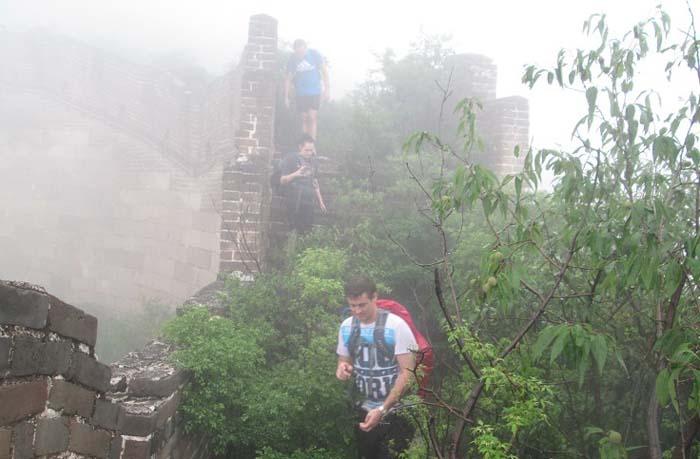
After waking up in the morning we will have
a Chinese-style breakfast first. In order to hike on Jiankou, first we have
to climb up a path for about 30-40 minutes (2km) to reach it.
Our hike today will take about 2.5 hours and will cover 4km. Jiankou is translated as 'Arrow Nock' in English, for the shape
of the
mountain is like an arrow, with the collapsed ridge
opening as its arrow nock. The Jiankou
section is known for its ruggedness and wild beauty, and you
will be in awe of the marvelous views it affords. As soon as we
reach Jiankou we will see a deserted watchtower that gives you a
panoramic view of the entire valley. In the early morning the
view is priceless with its morning fog. This section of the wall
is not well known by tourists, although if you see a picture of
the Great Wall from exotic traveling magazines, chances are it
is from Jiankou. This is the pinnacle of exotic Great Wall
scenery.
This part of the wall is often empty, so
you will have some peace and serenity on your hike today. Our
hike will begin in earnest from the watchtower known as
“Defending General”, and over the course of our trek we will
pass through seven to eight different watchtowers. Over the next
two hours we will be moving from west to east. As
we trek we’ll be able to see “Ying Feng Dao Yang” so named
because this watchtower was erected on the highest peak in the
area, and eagles and hawks often perch on it. Although the
majestic wall is slowly being conquered by small trees and
brambles, but the view from the top is still stunning! Other
landmarks will include the “Beijing Knot “ and the “Heavenly
Ladder”, but we will not be able to scale these peaks as they
are not accessible due to its toughness and dangerous footing.
The toughest challenge that this hike presents is a
portion known as the “38 Steps”, where the Wall vastly increases
in steepness, to the point that it is near 70 degrees! It is due
to this feature that we advise those with heart problems or a
phobia of heights not to go on this trip. The rest
of the hike is mostly smooth sailing.
We’ll end today’s hike at “Jiankou”, or
“Creek Pass” in English, which although pronounced the same as
the Great Wall section, has a different meaning in Chinese and
is composed of different characters. At “Jiankou” we’ll scale
down the wall, which, like the walk to get on, should take
roughly 30 minutes (2km). Once we descend from the Great Wall we
will spend the night at a farmer’s inn. The farmer’s family will
prepare for you a dinner of traditional Chinese dishes. Be sure
to get a good night’s sleep, for tomorrow we descend the wall
again at Zhengbeilou, where we will eventually cross over into
the Great Wall at Mutianyu.
Tonight, we will sleep at the foot of
Jiankou. The hostel is call "Miss-U-Much" in English. it is
certified by Great Wall Adventure Club. You can see the logo at
the entrance.
[TOP]
|
Day 10: Jiankou-Mutianyu (B+L+D, 10
kms/6
miles, 4 hours)
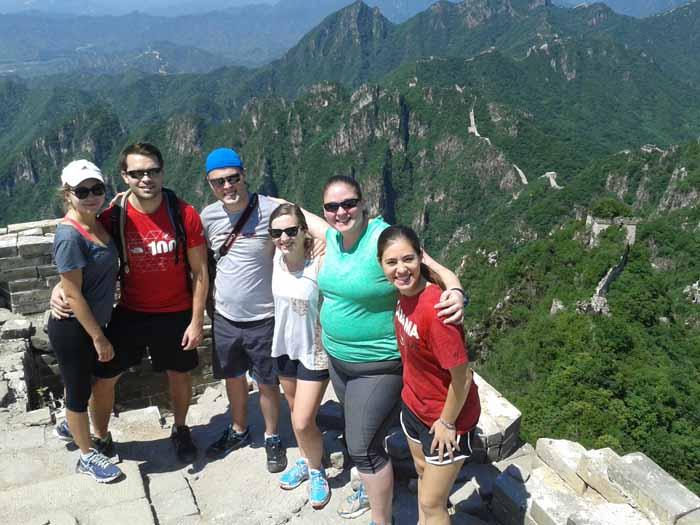
Our hiking will end on a high note as we will be visiting
hikers’ most favorite section of the Great Wall. . In order to
hike on Jiankou, first we have to climb up a path for about 60
minutes to reach it. Our hike will today will take about 4 hours
and will cover 10km/ 6 miles. The Jiankou section is known for
its ruggedness and wild beauty, and you will be in awe of the
marvelous views it affords. As soon as we reach Jiankou we will
see a deserted watchtower that gives you a panoramic view of the
entire valley. In the early morning the view is priceless with
its morning fog. This section of the wall is not well known by
tourists, although if you see a picture of the Great Wall from
exotic traveling magazines, chances are it is from Jiankou. This
is the pinnacle of exotic Great Wall scenery.
This part of the wall is often empty, so you will have some
peace and serenity on your hike today. Another highlight of
Jiankou is the enemy observation tower known as, "Ying Fei Dao
Yang", so named because this watchtower was erected on the
highest peak in the area, and eagles and hawks often perch on
it. Although the majestic wall is slowly being conquered by
small trees and brambles, but the view from the top is still
stunning!
From Jiankou we will cross over onto Mutianyu, a section of the
wall that has been largely restored. Although it has gotten a
face-lift, it avoids the army of tourists that plague
Badaling.
Mutianyu offers some breathtaking views of the valley and wall
below, and if you look to your right you’ll see a large sign
engraved in the side of the mountain encouraging you to “Cherish
the teachings of Chairman Mao.” Mutianyu has also become popular
for visiting foreign leaders and celebrities (former U.S.
President Clinton visited Mutianyu on one of his trips to
China).
You can hike down to the parking lot, take a cable car, or take
a toboggan ride (extra fee, highly recommended, and lots of
fun!) down to meet our driver.
Tonight, we will move to Huanghuacheng to sleep in a local
hostel called "Good Fortune." It is a hostel certified by Great
Wall Adventure Club. You can see our logo at the entrance.
[TOP]
|
|
Day 11:
Huanghuacheng-Xishuiyu Lake Side Wall Hike (B+L+D, 8 kms/6
miles, 4 hours)
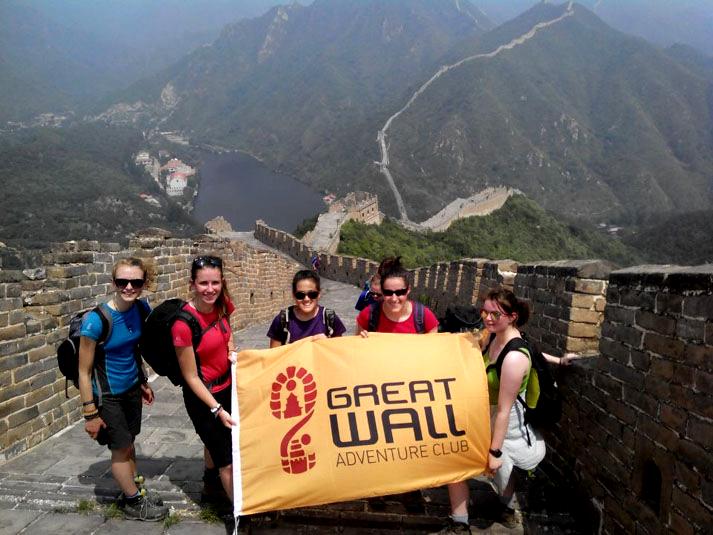
Following breakfast we will be driven
directly to Hunaghuacheng (or Huanghua Great Wall). After a
short walk around the dam on the Huanghuacheng Reservoir, we
will start our hike westward to Xishuiyu.
Going to the Huanghuacheng Great Wall, you have four things to do at least.
First, you should take photos. Since the lake breaks this
section of the Great Wall into three segments naturally, its
uniqueness might surprise you. And the Huanghuacheng Reservoir
lies here, shaped like a curved moon. Second, go to visit the
chestnut garden under the Great Wall, dating back to the Ming
Dynasty. The ancient chestnut trees still grow very well. Third,
climb up the steepest section of the Huanghuacheng Great Wall,
Shibadeng. It is like a dragon, ready to fly into the blue sky.
Fourth, look at Yaoziyu Castle. It was built in the Ming
Dynasty, still well preserved. In the castle, there is an
ancient Chinese scholar tree. It is said that touching it could
bring you a blessing.
The highest point of the wall is a
broken watchtower, and from there you will have a wide panoramic
view of the whole valley. From this summit the Wall dives
steeply downwards into the valley. The Gate is located at the
bottom, an opening in the wall, which connects the Zhuangdaokou
village on the inside, with the still-well-preserved Yaoziyu
Castle, built in the Ming Dynasty, on the outside. Over the top
of the passageway is another watchtower where we will rest a
short while before continuing on. On the inside of the gate you
will notice three large characters carved in the stone,
indicating the name of the village – ZhuangDaoKou. On the
outside is written the name of the passageway - “ZhenNu Pass” -
meaning “Defeat to Invaders”, a warning to potential attackers
in ancient times.
From here we will continue to trek
westward, climbing towards the broken wall to our destination, a
peak overlooking Xishuiyu Lake. From our vantage point, we will
see a real treat, the broken wall running underwater! From this
point, the wall is in too bad a condition to walk, so we will
follow a delightful mountain trail to Xishuiyu village, where we
will have a gourmet country-style Chinese lunch and have a
break. We’ll then drive back to Beijing, where you will be taken
back to your hotel.
[TOP]
|
Day 12:
Sightseeing of Beijing's Must-sees (B+L)
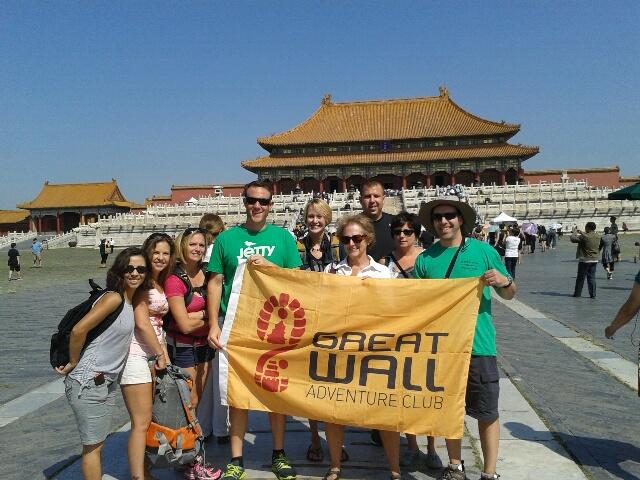
You may choose one of our exciting city tours to any of
Beijing’s great sights and attractions. If you like you can
visit the Forbidden City, Temple of Heaven, the Summer Palace,
the three attractions that you shouldn't miss. If the hike has
worn you out, you can take a cultural tour of old Beijing such
as our daily tour of
"The
Half-day Beijing Hutong Tour." It's your choice. This will give you an overview of
Beijing folk culture and daily life. You'll sleep in Beijing for
one more night.
That will end your unforgettable Great Wall and Beijing tour!
[TOP]
|
|


